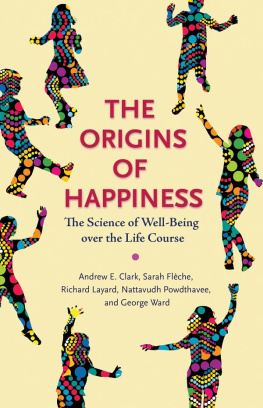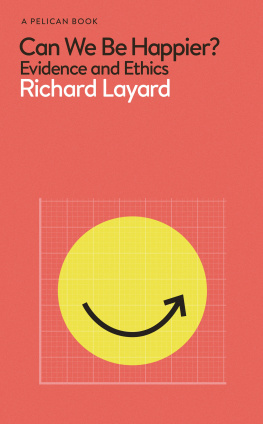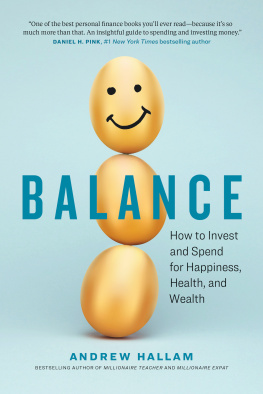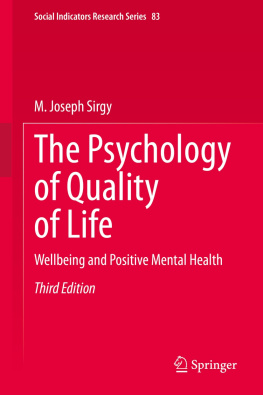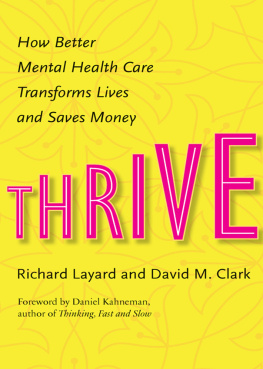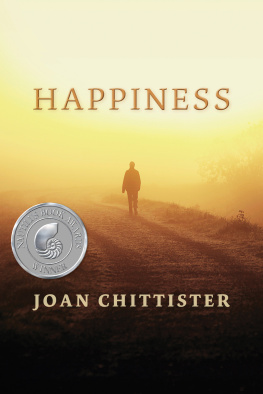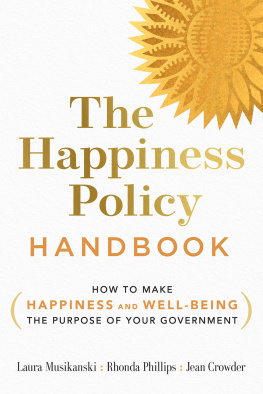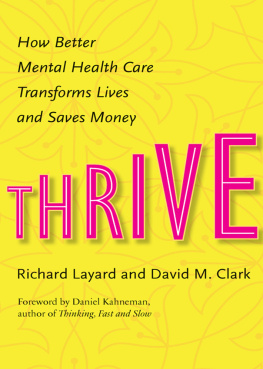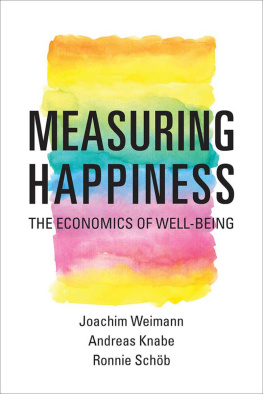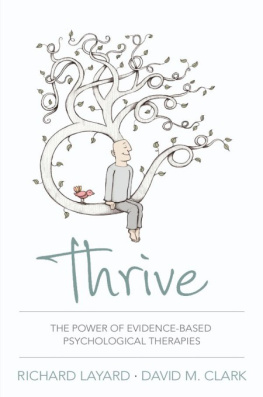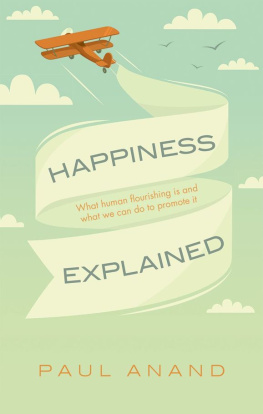THE ORIGINS OF HAPPINESS
THE ORIGINS OF HAPPINESS
The Science of Well-Being over the Life Course
Andrew E. Clark, Sarah Flche,
Richard Layard, Nattavudh Powdthavee,
and George Ward
Princeton University PressPrinceton & Oxford
Copyright 2018 by Princeton University Press
Published by Princeton University Press,
41 William Street, Princeton, New Jersey 08540
In the United Kingdom: Princeton University Press,
6 Oxford Street, Woodstock, Oxfordshire OX20 1TR
press.princeton.edu
Jacket image courtesy LZT / Alamy Stock Vector
All Rights Reserved
ISBN 978-0-691-17789-2
British Library Cataloging-in-Publication Data is available
This book has been composed in Sabon and Scala Sans
Printed on acid-free paper.
Printed in the United States of America
1 3 5 7 9 10 8 6 4 2
TO GUS ODONNELL CHAMPION OF WELL-BEING

CONTENTS

THE ORIGINS OF HAPPINESS
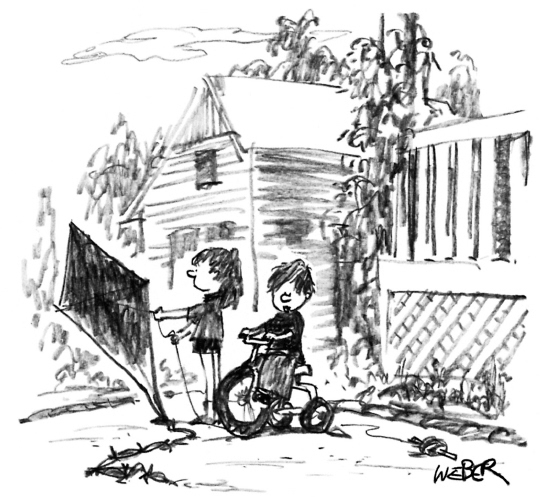
I cant wait to grow up and be happy.
Introduction: The New Paradigm
All great truths begin as blasphemies.
George Bernard Shaw
In April 2016, the German chancellor, Angela Merkel, launched a big national consultation. It was called What Matters to Us? Was she mad, or are we actually quite confused about what matters most to us and what real human progress would look like?
Money is a very visible indicator, and until recently many people would have given it pride of place. But now, worldwide, people are demanding a better concept of progress. They are rejecting wealth and income as the overriding goals for policy developmentand for personal lifestyles. And they are turning instead to the much broader idea from the eighteenth-century Anglo-Saxon Enlightenment: that we judge our progress by how much people are enjoying their lives.
This noble and humane ideal has been a central strand in modern Western civilization for over two hundred years. And it has profound implications for how we should live our own lives, and for how our policy makers should make their choices. For individuals it provides the ethical principle that we should create as much happiness in the world as we can, and as little misery.
We agree with him. But how to implement this objective? Until recently it was not easy. There was no agreed way of measuring whether people were enjoying the science tells us a great deal about what can actually be done to increase well-being.
The main purpose of this book is to set out that knowledge as clearly as possible and to lay out in quantitative terms what is known about the causes of well-being. This is crucial for us as individualsand also for policy makers.
Imagine a policy maker trying to allocate extra resources between youth training or mental health. Or the chief executive of an NGO choosing the balance between care of the elderly or support for young mothers. How can such choices be made in a rational way? Clearly there has to be some way of comparing the benefits of each alternative, using some common measure of benefit. Only if this is done can the policy maker attempt to generate the maximum total benefit from the available resources.
Until recently the recommended measure of benefit was the amount of money people would be willing to pay for the outcome. This may make some sense for some types of expenditure, but it could never make sense for much of public expenditureon health care, elderly care, child protection, But everywhere the key issue is: What is the best measure of the quality of life?
Measuring Happiness
In our
When people answer this question, they are evaluating their own overall well-being. That is why we like this question. But well-being is often measured in other ways. One approach is to try to catch peoples moodtheir current hedonic feelings life-satisfaction as our measure of well-being for a number of reasons.
First, it is comprehensiveit refers to the whole of a persons life these days. Second, it is clear to the readerit involves no process of aggregation by researchers. Third, and most important, it is democraticit allows individuals to assess their lives on the basis of whatever they consider important to themselves. It does not impose anybody elses views on what emotions or experiences are valuable. This is particularly important if we want policy makers to use these results. In a democracy politicians should not make judgments about what is good for peoplethey should create the conditions where people are satisfied with their lives.
Increasingly, policy makers feel comfortable about this approach to their
But how reliable is the measure? Do different people use the scale in the same way when they answer the question? To some extent they must do so because, as the book will show, we can predict a persons measured life-satisfaction with some
Table 0.1. Factors explaining the existing governments vote share (partial correlation coefficients)
Life-satisfaction | 0.64 |
Economic growth | 0.36 |
Unemployment | 0.06 |
Inflation | 0.15 |
Can we also use life-satisfaction when we measure the well-being of children? Clearly the quality of life they experience is intrinsically as important as that experienced by adults (and it is even more important if we also include its effect on the resulting adult). But children are less able than adults to make judgments about their experience. That is why younger children are not asked Similar questions about the childs mood and feelings are asked of their parents and teachers. So we aggregate these answers as our measure of child well-being.
Thus, to summarize so far, we are interested, for all individuals, in their well-being over their lifespan. In adulthood that is measured by life-satisfaction, and in childhood by mood and feelings.
Causes of Happiness over the Life Course
Having measured happiness, the next key step is to explain itto understand why some people flourish, while others languish. The main purpose of this book is to set out a comprehensive map of the causes of well-beingin a novel way. Putting it bluntly, most existing well-being research focuses on only one cause at a time (often with some controls) and shows that it influences well-being in a statistically significant way. Not only that, but well-being is generally measured in different ways in different studies.
Our approach is different. First, we use only one measure of well-being, so that we can unambiguously compare the effects of different factors. And, second, we estimate the effect of all these factors simultaneously, so that we can really isolate the effect of changing each one of them on its own. This is really crucial because most policies are targeted at specific variables, like income or health. To know the effects of changing any one of these, we will often want to assume that the others remain constant.
So our analysis will show the relative course of our lives. We need to answer questions like:
Which dimensions of childhood are the more importantintellectual, behavioral, or emotional?
Which aspects of life should be targeted, at what ages?
Our model of life (excluding old age) is described somewhat crudely by development and behavior we measure at age 16, but we measure intellectual development by the highest qualification ever obtained. The child then develops into an adult, with many new dimensions of successincome, employment, family formation, noncriminal behavior, and health (both physical and mental). And these adult outcomes then determine the persons life-satisfaction.
Next page
